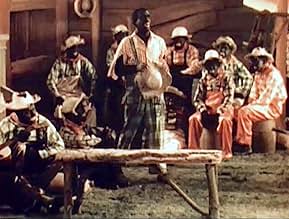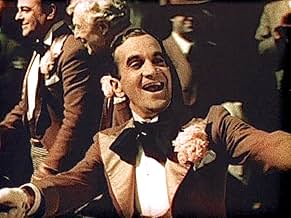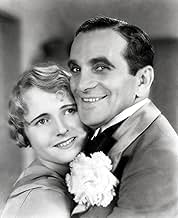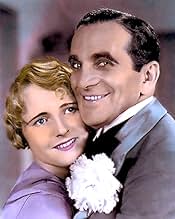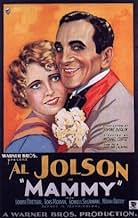A love triangle develops in a traveling minstrel troupe.A love triangle develops in a traveling minstrel troupe.A love triangle develops in a traveling minstrel troupe.
- Awards
- 1 win total
Allan Cavan
- Doctor
- (uncredited)
Richard Cramer
- Detective
- (uncredited)
Stanley Fields
- Pig Eyes
- (uncredited)
Lloyd Ingraham
- Deputy Sheriff
- (uncredited)
Ben Taggart
- Sheriff
- (uncredited)
Grant Withers
- Reporter in Trailer
- (uncredited)
Featured reviews
Al Jolson occupies an unusual place in cinematic heritage. Dubbed the world's greatest entertainer, and certainly the most popular one in his day, Jolson will also forever remain famous for being the star of the world's first talking picture. And yet, due to much of his act and many of his screen appearances being in blackface, as well as the general quaintness of his style which owes far more to the musical hall than it does the screen, he is a figure whose work is today discussed far more than it is enjoyed.
Mammy was Jolson's fourth movie, and perhaps surprisingly is the first in which he had been paired with a major hit songwriter – in this case, Irving Berlin. The lesser-known Ray Henderson may have given Jolson his biggest hit with "Sonny Boy", but Irving's knack of mixing upbeat jollity with a bittersweet tug chimes in perfectly with Jolson's own style. The key song of Mammy is "Let Me Sing and I'm Happy" which is among Berlin's simplest both in melody and sentiment, and really suits Jolson's persona down to the ground.
Mammy also sees Jolson placed before a rather heavyweight director of dramas, namely Hungarian émigré Michael Curtiz, as opposed to comedy and musical specialist Lloyd Bacon who had helmed his previous two releases. Curtiz's tendency to fill up spaces with layers of extras and assorted business, tightly framing actors amid their settings isn't really what this picture needs, but nevertheless the director adds a few little touches to help ease out the story's emotions. Most notably we have several facial close-ups, a couple of Louise Dresser and one of Lois Moran. A pretty standard trick, but these are not just any close-ups. Take the one of Dresser after she has said goodbye to Jolson. Behind her we see some people walking to screen left, after which we cut to the train pulling away screen right, making it visually appear that the two shots are moving in opposite directions. Curtiz was also known to encourage restrained performances from his cast, and indeed we do get some beautifully understated turns from silent stars Louise Dresser and Hobart Bosworth. Even Al himself is a good deal more subtle under the influence of Curtiz.
However, the real key to Mammy's appeal – the reason why these pictures were more than just Jolson showcases – is the way that the songs are placed within the narrative. This is of course long before the days when the "integrated" musical was commonplace, and yet the emotional weight of each song has undergone consideration, probably by original "idea" writer Berlin, such story-based song deployment being another of his talents. Jolson's performance of "Looking at You" ironically comes just after his inadvertently putting himself in an embarrassing situation with Lois Moran, and the utter inappropriateness of the song at that moment increases that feeling of awkwardness. "Let Me Sing and I'm Happy" as well as being Jolson's introductory number, is reprised twice, firstly when he is about to be arrested, and again at the end of the picture – each time for completely different impact due to its placement. And this is something Jolson himself is clearly aware of, putting a veneer of professionalism over each rendition, but allowing his character's emotional state to show through according to the context in which the song is sung.
This may be one of the finest Jolson features, but ironically it was part of a downward turn in his career. His pictures were becoming repetitive, and now a few years into the talkie era he was less of a novelty. He would disappear from screens for a few years before reinventing himself as a more conventional musical star for the mid-30s, more or less divorced from his music-hall roots. Still, Mammy provides an opportunity to see him as he was to early audiences, before he even stepped in front of a camera, taking simple, hackneyed routines, pouring in his heart and soul and making them his own.
Mammy was Jolson's fourth movie, and perhaps surprisingly is the first in which he had been paired with a major hit songwriter – in this case, Irving Berlin. The lesser-known Ray Henderson may have given Jolson his biggest hit with "Sonny Boy", but Irving's knack of mixing upbeat jollity with a bittersweet tug chimes in perfectly with Jolson's own style. The key song of Mammy is "Let Me Sing and I'm Happy" which is among Berlin's simplest both in melody and sentiment, and really suits Jolson's persona down to the ground.
Mammy also sees Jolson placed before a rather heavyweight director of dramas, namely Hungarian émigré Michael Curtiz, as opposed to comedy and musical specialist Lloyd Bacon who had helmed his previous two releases. Curtiz's tendency to fill up spaces with layers of extras and assorted business, tightly framing actors amid their settings isn't really what this picture needs, but nevertheless the director adds a few little touches to help ease out the story's emotions. Most notably we have several facial close-ups, a couple of Louise Dresser and one of Lois Moran. A pretty standard trick, but these are not just any close-ups. Take the one of Dresser after she has said goodbye to Jolson. Behind her we see some people walking to screen left, after which we cut to the train pulling away screen right, making it visually appear that the two shots are moving in opposite directions. Curtiz was also known to encourage restrained performances from his cast, and indeed we do get some beautifully understated turns from silent stars Louise Dresser and Hobart Bosworth. Even Al himself is a good deal more subtle under the influence of Curtiz.
However, the real key to Mammy's appeal – the reason why these pictures were more than just Jolson showcases – is the way that the songs are placed within the narrative. This is of course long before the days when the "integrated" musical was commonplace, and yet the emotional weight of each song has undergone consideration, probably by original "idea" writer Berlin, such story-based song deployment being another of his talents. Jolson's performance of "Looking at You" ironically comes just after his inadvertently putting himself in an embarrassing situation with Lois Moran, and the utter inappropriateness of the song at that moment increases that feeling of awkwardness. "Let Me Sing and I'm Happy" as well as being Jolson's introductory number, is reprised twice, firstly when he is about to be arrested, and again at the end of the picture – each time for completely different impact due to its placement. And this is something Jolson himself is clearly aware of, putting a veneer of professionalism over each rendition, but allowing his character's emotional state to show through according to the context in which the song is sung.
This may be one of the finest Jolson features, but ironically it was part of a downward turn in his career. His pictures were becoming repetitive, and now a few years into the talkie era he was less of a novelty. He would disappear from screens for a few years before reinventing himself as a more conventional musical star for the mid-30s, more or less divorced from his music-hall roots. Still, Mammy provides an opportunity to see him as he was to early audiences, before he even stepped in front of a camera, taking simple, hackneyed routines, pouring in his heart and soul and making them his own.
... that being Al Jolson. This film adapts the play "Mr. Bones" along with its Irving Berlin songs to the screen, with Al Jolson doing much of the singing as lead Al Fuller in "Meadows Musical Minstrels". Jolson's last film, "Say it with Songs", from 1929 had a real dive in revenue compared to his first two films. Maybe that was because of the changing times and the novelty of sound had worn off, maybe it was because, with that novelty wearing off, Jolson had looked somewhat ridiculous in his scenes with little Davey Lee in Say It With Songs.
So this time around, no melodramatic scenes with an ailing child. Jolson is largely shown doing what he did best - perform musically on the stage, except in a film. Director Michael Curtiz adds some visual flair to this one with some parade scenes, including one in "the rain" in which nobody seems to get that wet. Also there is a train scene with a babbling brook nearby as the locomotive lumbers past, and clouds going by overhead. Not the usual Warner stock footage that they did in their early years after escaping their poverty row roots.
A very basic story is added to the minstrel musical scenes. Al has a mother that he seems to visit just to say goodbye to. He is secretly in love with Norma, the daughter of the owner of the show, who is engaged to a man (Lowell Sherman) who never saw a skirt he didn't want to chase. And to top it all off, Al is framed for an attempted murder.
It was interesting to see Lowell Sherman here as the skirt chasing interlocutor. He has a much more restrained presence than he usually has in his films where he is best known as being flamboyant, plus he was a director himself. It would be interesting to know how he and Curtiz got along on the set.
I'd recommend this mainly for Jolson fans and for fans of the early talkies. Technically this IS a precode, but the only thing close to a precode moment is when Al goes into Norma's dressing room after her performance, and while they are casually talking, just starts helping her undress. They both have a moment of mild embarrassment when they realize she is standing there, talking to this casual friend, clad only in her underwear!
So this time around, no melodramatic scenes with an ailing child. Jolson is largely shown doing what he did best - perform musically on the stage, except in a film. Director Michael Curtiz adds some visual flair to this one with some parade scenes, including one in "the rain" in which nobody seems to get that wet. Also there is a train scene with a babbling brook nearby as the locomotive lumbers past, and clouds going by overhead. Not the usual Warner stock footage that they did in their early years after escaping their poverty row roots.
A very basic story is added to the minstrel musical scenes. Al has a mother that he seems to visit just to say goodbye to. He is secretly in love with Norma, the daughter of the owner of the show, who is engaged to a man (Lowell Sherman) who never saw a skirt he didn't want to chase. And to top it all off, Al is framed for an attempted murder.
It was interesting to see Lowell Sherman here as the skirt chasing interlocutor. He has a much more restrained presence than he usually has in his films where he is best known as being flamboyant, plus he was a director himself. It would be interesting to know how he and Curtiz got along on the set.
I'd recommend this mainly for Jolson fans and for fans of the early talkies. Technically this IS a precode, but the only thing close to a precode moment is when Al goes into Norma's dressing room after her performance, and while they are casually talking, just starts helping her undress. They both have a moment of mild embarrassment when they realize she is standing there, talking to this casual friend, clad only in her underwear!
7tavm
Just watched this on Warner Archive DVD. It also had the trailer for it in which star Al Jolson is "interviewed" by a reporter about his latest picture. I put "interviewed" in quotes because I'm sure that "reporter" was another actor helping plug the picture. Anyway, I enjoyed the story and performances though it's really Jolson's songs-mostly written by Irving Berlin-that help sell the movie on its merits. This version has the restored 2-strip Technicolor sequences that looked pretty good for its age. Some of those scenes had to be accompanied by sepia-toned black and white ones to show them complete which didn't distract me too much. In summary, Mammy-despite some now-politically incorrect stereotypes concerning the blackface sequences-was pretty entertaining.
I saw today the restored version of "Mammy," restored in that the two colour sequences have been put back in. (Some areas had to use sepia-tinted bridging sequences.) I'm no fan of Jolson, but the movie did keep my interest, the presentation was good, and Al here is somewhat restrained, all of which added up to a surprisingly good time. Presentation (including a very good soundtrack) is everything
If Mammy is remembered for anything it is for providing Al Jolson with one of his biggest song hits, definitely the biggest song hit he had written especially for the screen. Irving Berlin wrote this number for Jolson and he does it three times in his usual bravura style and on two of those occasions without black-face.
Al Jolson got his start in minstrel shows which were still popular at the turn of the 20th century. He's Al Fuller in this show, lead singer in this troupe and a man with a case of unrequited love for the owner of the show. From there springs the plot.
It's unfortunate for Jolson's current reputation that he did not abandon the black-face which was a carryover from his minstrel days. It's considered offensive now and rightly so. But listen to him sing Let Me Sing and I'm Happy and the rest of the score and you're hearing one of the great song stylists ever.
Irving Berlin wrote some original material for this film which was interpolated with some other standards. It is also good to hear Jolson do two of his comedy numbers, Who Paid the Rent for Mrs. Rip Van Winkle and Why Do They All Take the Night Boat to Albany. It's his ballads that he's remembered for today, but these numbers give you an idea of more of the kind of material he did on stage.
A lot of people will be rightly offended in seeing Mammy now, but like Bing Crosby's Dixie, it's an interesting piece of cinema history.
Al Jolson got his start in minstrel shows which were still popular at the turn of the 20th century. He's Al Fuller in this show, lead singer in this troupe and a man with a case of unrequited love for the owner of the show. From there springs the plot.
It's unfortunate for Jolson's current reputation that he did not abandon the black-face which was a carryover from his minstrel days. It's considered offensive now and rightly so. But listen to him sing Let Me Sing and I'm Happy and the rest of the score and you're hearing one of the great song stylists ever.
Irving Berlin wrote some original material for this film which was interpolated with some other standards. It is also good to hear Jolson do two of his comedy numbers, Who Paid the Rent for Mrs. Rip Van Winkle and Why Do They All Take the Night Boat to Albany. It's his ballads that he's remembered for today, but these numbers give you an idea of more of the kind of material he did on stage.
A lot of people will be rightly offended in seeing Mammy now, but like Bing Crosby's Dixie, it's an interesting piece of cinema history.
Did you know
- TriviaA preserved print of this film survives in the UCLA Film and Television archives.
- ConnectionsFeatured in Hollywood and the Stars: The Immortal Jolson (1963)
Details
- Runtime
- 1h 24m(84 min)
- Color
Contribute to this page
Suggest an edit or add missing content

